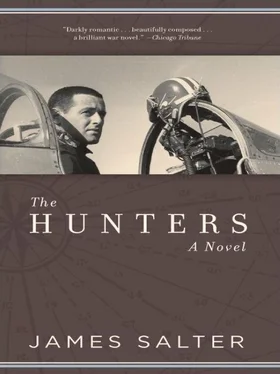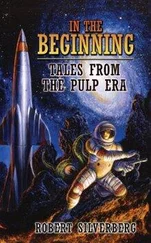DeLeo was in the bar with Guthrie, a pilot from one of the other squadrons. Cleve sat down with them. It was dark outside by then, and the room’s dim lights created a texture of hotel velvet, although all the upholstery was cotton.
“You just get in?” Cleve asked Guthrie.
“This morning.”
“How are things back at Kimpo?”
“Haven’t you heard?”
“What?”
“Where have you been all day?” DeLeo asked.
“Bicycling around town.”
“Bicycling. Well, that’s living, I suppose. Have a drink.”
Cleve ordered one. The bar girl, her mouth hiding its smile, brought it.
“Thank you. You’re a lovely girl, Mary, do you know?”
The smile broke out.
“Well, Bert,” he said, “here’s to your children.”
“Whoever they are. Have you really been riding a bicycle all day?”
“Absolutely. Most of the day, anyway.”
“You have, eh? Have you heard the news?”
“No. Is the war over? Nothing would make me happier right now.”
“There was a big fight yesterday afternoon. We lost three ships.”
Cleve’s stomach went empty as if under a blow. There had been a big fight, and he had been in Tokyo. He felt like a man washed overboard a thousand miles from shore.
“Who?” he asked.
“Desmond in your squadron for one,” Guthrie said.
“Desmond? How did it happen?”
“He got hit and had to bail out. They saw his chute open.”
“Where was it?”
“Right on the river.”
Up at the Yalu. It seemed a planet away. Desmond was alone up there, on the green bottom of the great sea of air in the most crushing solitude. In one agonizing moment of departure he had fallen from loftiness to doom, to the hostile earth where he became trembling prey.
“Did they get any MIGs?” Cleve asked.
“Eight.”
It was even worse than he had thought. He felt his mouth weaken.
“There must have been a lot of them up,” he said.
“More than I’ve ever seen, but that’s not all.”
“Christ, what more? Pell make ace?”
“No, nothing like that,” Guthrie said.
“What?”
“Casey Jones is back.”
Cleve could suddenly hear his own heart and beyond it a faded Guthrie talking about markings, the black stripes. The words were indistinct. He was back. He had come back, like a lost planet, a dark star, changing the whole firmament. There was nothing but that, like a cry of plague. Cleve stared at his watch. Guthrie was still talking.
“I’m going up to pack.”
“Pack?” DeLeo said.
“There’s a plane we can go back on tonight.”
“We’ve got two days left,” DeLeo protested.
“And we’ll be there in the morning.”
“For Christ’s sake,” DeLeo complained, “what’s the hurry? Use your head. We won’t get another leave for months. I’ve got a regular volcano lined up at the Bacchus tonight.”
“Guthrie can take care of her.”
“The hell he can.”
“I don’t care,” Cleve said. “Stay if you want to. I’m going back.”
“Goddamn it,” DeLeo began, but he was already alone. He finished his drink in a swallow and followed.
“Get one for me,” he heard Guthrie call from the bar.
There was no way to telephone her. In his room, Cleve sat down and hurriedly wrote a note.
…I’d hoped to see you tomorrow, but I’ve just learned that I must go back to my squadron tonight. The war.
I don’t know when I’ll be able to come to Tokyo again, in two months, perhaps. It seems a long time. Summer. All the talking we did, all the things unsaid, at least that I meant to say. Next time.
As they left the hotel, he gave the addressed envelope to a cab driver to deliver.
Riding out to the airfield, he watched the lights of the city grow thinner as they passed to its shallows and beyond. It seemed, somehow, that the leave had vanished in a few crowded hours.
They landed at Seoul at 5:30 in the morning. It was chilly, with mist lying gray in the land hollows. The wind blew fitfully and shifted a fine dust across the ground. The flight had been miserable. Imprisoned in the cold, sepulchral cabin of the transport, they had sat for almost five hours listening to the clamor of the engines and the chorus of shrill rattles that continually traveled the whole length of the ship in resonant phases. A pale dawn had at last appeared outside the windows and ended their sleeplessness, although it was some time before the strewn, crowded interior became light. There was the hush of early day over the countryside when they drove on to Kimpo, shivering a little and feeling a metallic emptiness in their bellies.
In the mess, everything seemed the same. There were a few tables of sleepy men, up for the early mission, eating breakfast in a silence broken only by the ring of utensils. Cleve had two pancakes, as thick as his thumb, with butter and thin tart syrup, and drank three cups of the canned orange juice, cold and tongue-puckering. He asked around about the day’s missions. There were four scheduled. The second one was to brief at 1015. They walked down the road to the barracks. It was still before seven. Everyone in the room was asleep. He lay on his cot for a long while before he was able to summon up his weariness to possess him.
The sound of ships returning from a mission awakened him. He listened in semi-awareness to them passing overhead and then looked at his watch. 0915. He sat up, his face near the window. Some more were coming. Their sound preceded them slightly. He saw them go by, moving like thrown spears, two of them, without tanks. After a minute came two more. He left the window and stood up, feeling drugged. The water on his face, as he shaved, revived him somewhat. He noticed DeLeo beginning to stir. It was soon 0930. In a few minutes they would have to start down for the briefing. While he was waiting for DeLeo to get dressed, Daughters came in.
“I wanted to make sure you were up. I thought you might want to go on this next one,” he explained.
“Have the names been posted yet?”
“Nolan’s waiting for you to give him ours.”
“Nolan. Is he taking Desmond’s place?” He tried to sound matter-of-fact.
“I guess so,” Daughters said.
“I see.” He did not, though. There was an unwanted silence.
“We didn’t expect you back so soon,” Daughters said. “Was Tokyo closed?”
“We were having too good a time,” DeLeo muttered.
“We had a bad one here. I suppose you heard.”
“We heard all right,” DeLeo said. “Has there been any word on Desmond?”
“No, nothing.”
As they waited outside for a ride, Cleve noticed three small locust trees between the barracks that were turning green. They stood huddled together on an embankment like three lost children. Suddenly he realized that it was relatively mild out. The winter had gone at last. The air was alive. It felt good to breathe it. Walking into combat operations, he saw that a fringe of palest grass was growing in the seams of the rotted sandbag barricades.
Pell was waiting for them inside.
“Hey, welcome home,” he said. “Thought you were safe in Tokyo.”
“Don’t be wise.”
“You sound mean, Captain. Well, you might see some action today.”
“What happened on the last mission?”
“They sighted a lot of MIGs, that’s all,” Pell replied. “No fight.”
They went in to the briefing room and sat down. In the row behind him, Cleve heard someone talking about the black-striped MIG.
“Diagonal. Five diagonal markings.”
“Five? How do you know it’s five?”
“Ask anybody. Ask Intelligence if you don’t believe me.”
“Have you seen him?”
“Yes, I’ve seen him.”
Читать дальше












